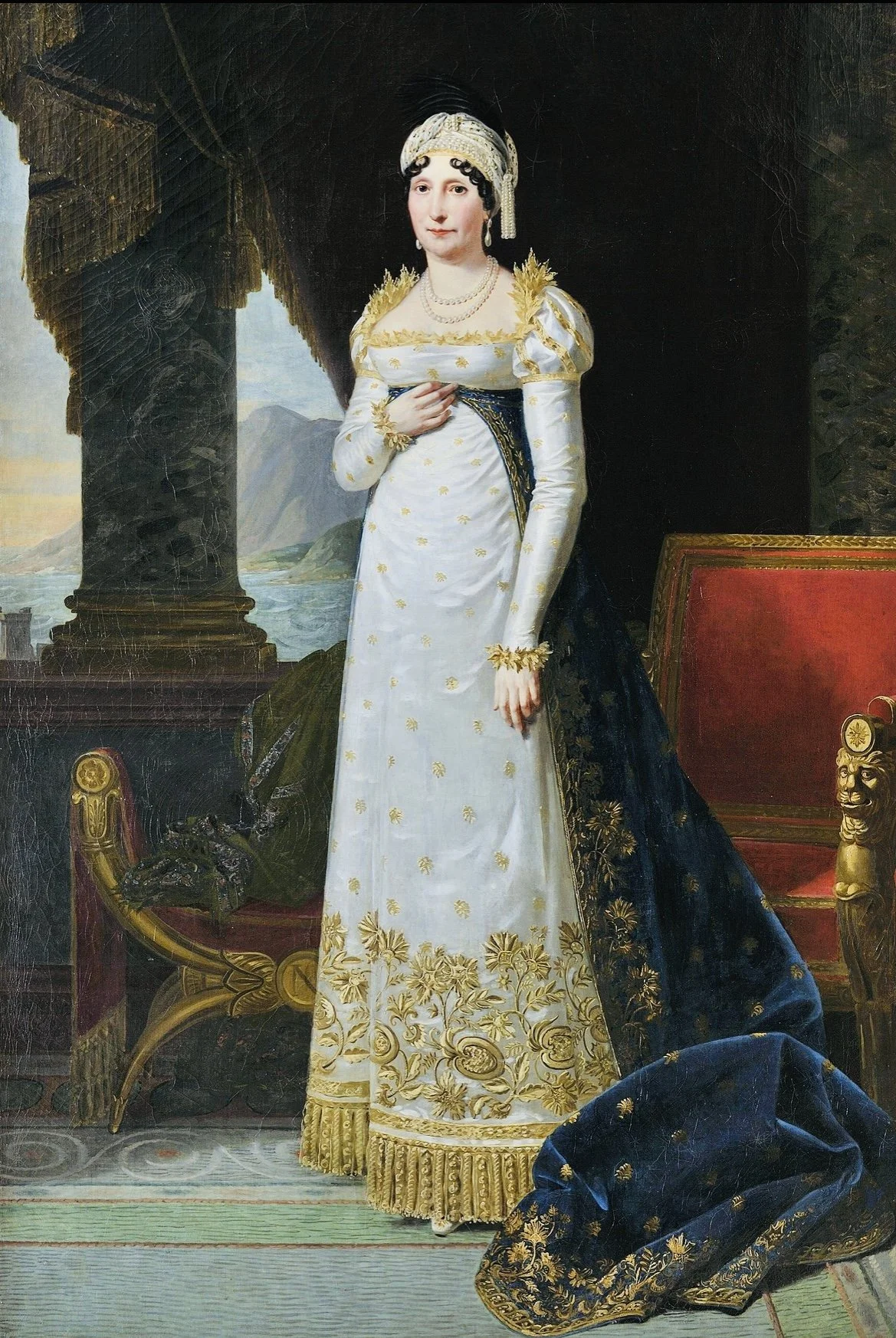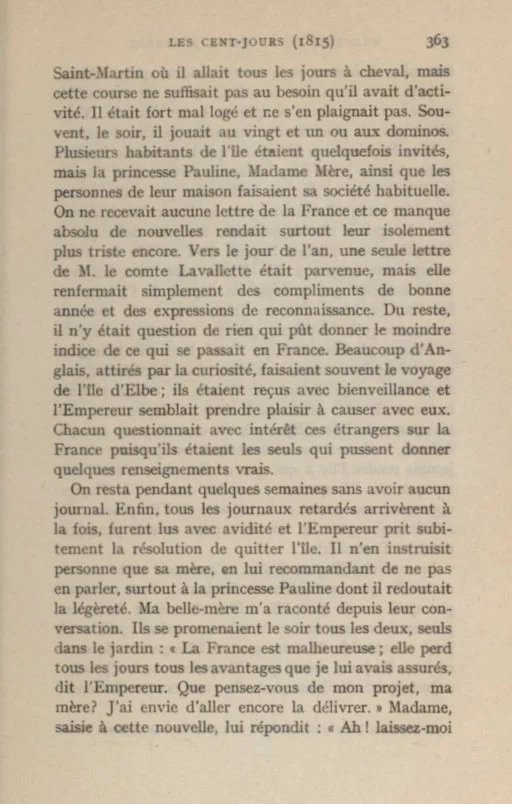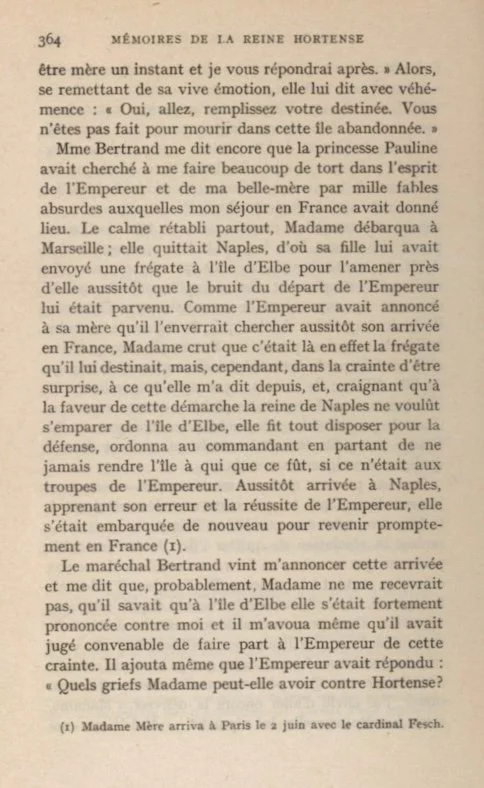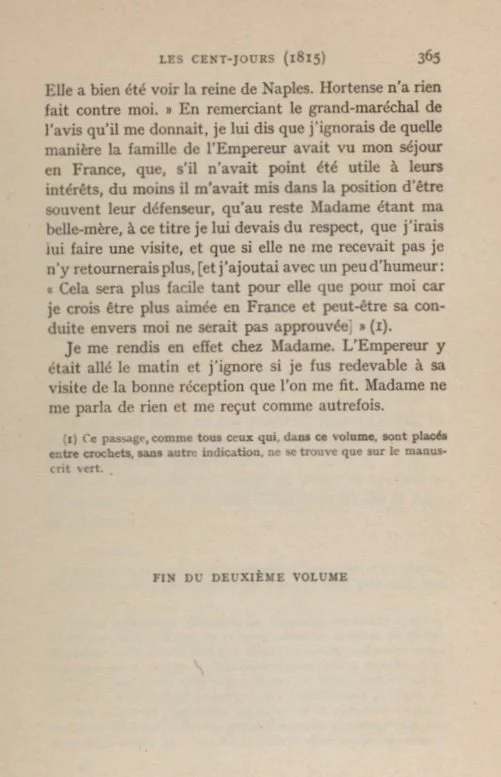Let’s have another look at Hortense’s Memoirs. If you want to read the book it is available for free at the side bar in English and French. Use the widget on the sidebar to translate the text below into pretty much any language.
Napoleon continues his efforts to reconcile Hortense with his family.
Hortense’s memoirs continues:
Some residents of the island were occasionally invited to see him, but the persons with whom he spent most of his time were Princess Pauline, Madame Mere and the members of their suite. No letters came from France, and this complete lack of news rendered their isolation still more painful.
About New Year's Day a single letter from Monsieur le Comte Lavallette had been delivered but it contained only New Year's greetings and expressions of his gratitude.
Nor were the exiles able to obtain by any other means the least indication of what was happening in France. Many English people made the trip to Elba out of curiosity. They received a cordial reception, and the Emperor seemed to enjoy talking to them.
Everyone questioned these visitors eagerly about France since they were the only ones from whom some true information could be secured. Several weeks passed without any newspapers being delivered.
Finally, all of those which had been delayed arrived at the same time. The Emperor read them eagerly and made up his mind to leave the island. The only person he informed of his intention was his mother, and he warned her to say nothing about it to anyone, least of all to Princess Pauline, whose lack of discretion alarmed him.
My mother-in-law has since described their conversation to me. It occurred one evening when they were alone together walking about the garden. The Emperor said: "France is miserable; she is losing every day some of those advantages I gained for her. What do you think of my project, mother? I wish to go and deliver her once more."
Madame Mere was overcome at this remark and replied, "Let me for a moment be only a mother, then I shall be able to answer you." Having regained her self-control she said firmly, "Yes, you must go; it is your destiny to do so. You were not made to die on this desert island."
Madame Bertrand also told me that Princess Pauline had done me a great deal of harm, as far as the Emperor and my mother-in-law were concerned, by repeating dozens of ridiculous stories that had sprung up because of my having remained in France. As soon as the situation had calmed down, Madame Mere landed at Marseilles. She came there from Naples, her daughter having sent a frigate to conduct her to that city as soon as the news of the Emperor's escape became known. Since the Emperor had said he would send for her as soon as he landed in France, Madame thought that this was a vessel he had dispatched.
Nevertheless, as she told me afterwards, fearing a surprise and thinking that the Queen of Naples might take advantage of the situation to seize Elba, she took all the necessary defensive measures and when she was leaving ordered the commanding officer not to surrender the island to anyone unless he came with orders from the Emperor.
Once she had landed at Naples and found out her mistake and the Emperor's success, she at once set sail again in order to arrive promptly in France.
Marshal Bertrand came to tell me of Madame Mere's arrival, saying at the same time that probably she would decline to receive me, for he knew that while at Elba she had condemned my conduct severely. He admitted that he had thought it best to mention this fact to the Emperor and added that the Emperor had replied: "What fault can Madame find with Hortense? She did not mind going to see the Queen of Naples. Hortense never took sides against me."
While thanking the Marshal for his advice I said that I knew what the Emperor's family thought about my stay in France, and, even though it had not helped them directly, at least it had frequently given me the opportunity to defend their cause.
Moreover, since Madame was my mother-in-law, I owed her respect and should therefore pay her a call. If she did not receive me, I should not go back.
I added somewhat maliciously: "A hostile attitude may do her more harm than it will me, for I know I am more popular than she is in France, and perhaps her conduct toward me will not be approved of."
Accordingly, I called on Madame. The Emperor had already been there that morning, and perhaps it was to his visit that I owed my cordial reception. Madame made no criticism of any kind and treated me just as she always had. Since his return the Emperor had been more inclined to see people.
The original French is available below:




